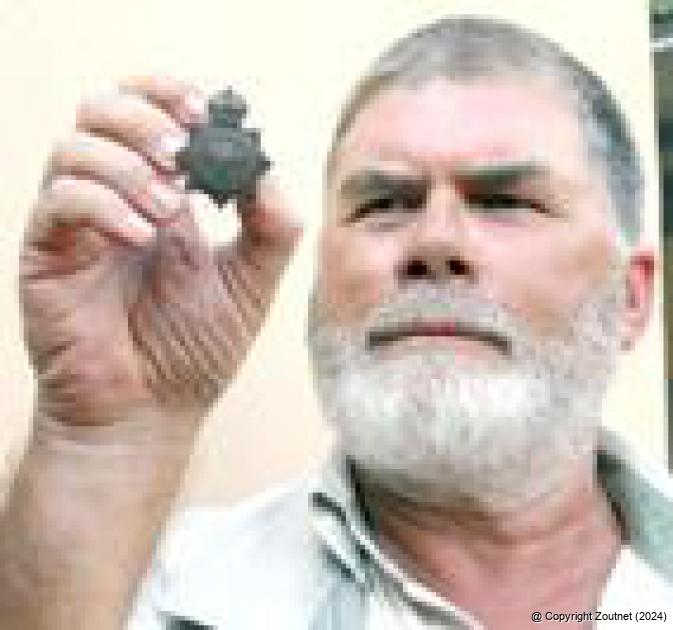
Gerwyn Watkins, better known as Gary, excitedly showed his finding of a badge most probably worn by members of the Transvaal Police around 1908.
News - Date: 23 February 2007
A cap badge found in an old ash pit recently excavated in Makhado (Louis Trichardt), throws new light on the dating of the horse shoes that were dug out there.
Gerwyn Watkins, better known as Gary, excitedly showed his finding of a badge worn by policemen on their headgear. Gary found the badge along with other historical items in the ash pit on a constructing site of the Dafel brothers southwest of the prison in town.
Those interested in local history, like Charles Leach, Cobus Holtzkampf and others, immediately set everything in motion when large heaps of horseshoes were discovered.
"We’re sitting on history here," were the words of Leach.
Fortunately Gary, who has a keen interest in digging up objects, as well as an excellent knowledge of military history, is also part of the team who succeeds in putting all the pieces of the historical puzzle together.
"The first findings were the horse shoes which are of European origin," said Gary. Some have holes for studs for slippery conditions. A number of different units could have utilised this site: the British forces whose members were absorbed into the South African Constabulary after the Anglo Boor War, the SA Constabulary, and the Transvaal Police, a new name for the former.
"It’s most likely the same men who were re-enlisted, only the names changed," said Gary. There was definitely a blacksmithy or stable on the premises.
When Gary found the cap badge, everything became clearer. He spoke to a lot of knowledgeable people in the country.
"It is a Transvaal Police cap badge. That points to 1908, when the SA Constabulary became the Transvaal Police," he said.
"The discovery included three cordite ‘doppies’, a Lee Metford Mark IV, a MARK VI and a .455 Webley that was used in the service revolver of a British officer," said Gary.
The first year that the Lee Metford used cordite was 1891, whereas they previously used black powder. The SA Brewery bottles found on the site could point to 1894 when the SAB was already trading in South Africa. A glass Codds Patent Bottle, usually closed with a marble, indicates the late 1800s. There was one unbroken clear glass bottle that could have been used for medicine. Some medicine bottles were blue, while others were clear glass. There were broken Holbrooks glass stoppers (1880-1900), a bottle piece from Chandlers & Company (1895+), and earthenware containers, maybe for horse rub or harness oil. There was one Birmingham button and a couple mother-of-pearl buttons. The ever present bully beef tin openers that formed part of the tins were found, in keeping even with today’s rations.
"If you are building, please contact me. There are definitely more ash pits waiting to be discovered," says Gary, who can be contacted on 082 868 1442 or 015 516 6601








